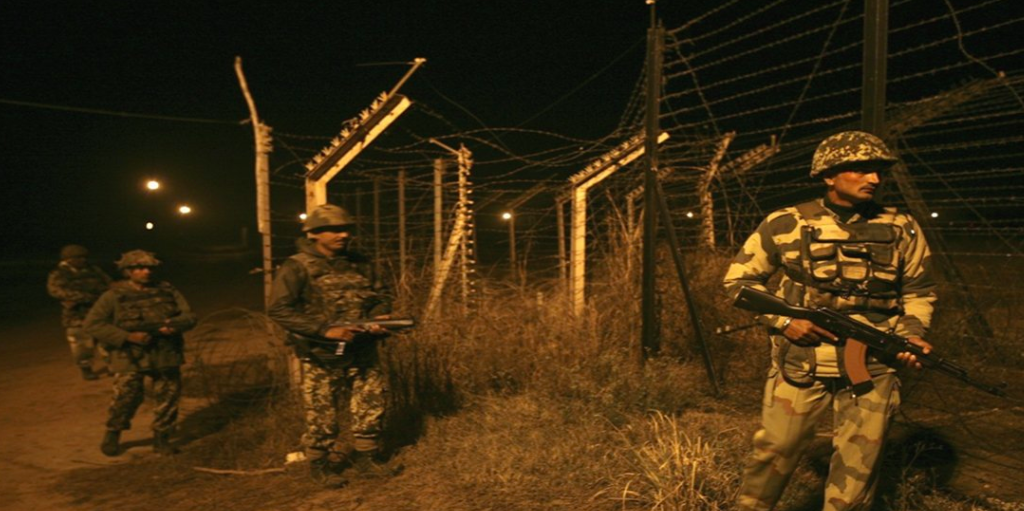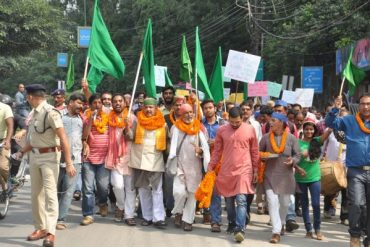It seems to have become a routine today to watch Army being dragged into political rivalries and debates at the drop of a hat. The fact that Indian Army, as are Navy and Air force, is a totally apolitical organisation doesn’t seem to bother anyone. Be it seasoned or petty politicians, pseudo liberals, social activists of all denominations, student leaders from supposedly elite institutions like Jawaharlal Nehru University and last but not the least political analysts – all seem to be working overtime to politicise the role of the man in uniform. Most of them are no better than the anti India Kashmiri separatist leaders, sympathisers and politicians in the valley who have always displayed an open hatred for the armed forces in general and Army in particular. They have always tried to project Army as a tool of political leadership at the centre. Today it appears they have succeeded since role and operations of the Army have become an inseparable part of political discussions in all kinds of forums. Political leadership, both in power and in opposition, use the institution of Army as a football to score goals against each other. The only saving grace is that the military has avoided any political posturing and continues to go about its tasks as hitherto before.
Given India’s size, geographic location, inimical neighbours and aspirations to be a part of the Super Power club, India has no choice but to have a strong and effective military. It does not matter if India has no expansionist desires and believes in peace. The nation still requires a strong military to act as a deterrent to enable the nation to exercise its will to live peacefully and coexist with other nations. The world’s largest democracy is blessed with a military that has remained apolitical and has never shown any inclination to be otherwise unlike most of its immediate neighbours and a host of other countries in various parts of the world. That speaks volumes for the ethos, training, professionalism and loyalty of India’s armed forces. Despite such impeccable credentials it is unfortunate that Indian political leadership and bureaucracy have tried to suppress its growth and played havoc with its potency over the decades in more ways than one. They have, by design, short charged the military and erroneously believed in the adage of ‘cutting it to size’ for reasons best known to them. The erroneous apprehensions that Pandit Nehru harboured against the armed forces seem to have found deep roots in the minds of politicians and bureaucrats – albeit at a cost to the nation. For bureaucracy one cannot rule out the aspect of envy – amounting to bitter jealousy – of the man in uniform who has always done the nation proud in whatever he does while bureaucracy has come a cropper more often than not.
It may be pertinent to cite some recent examples where Army has been dragged into political discourse when in reality there was no need to do so. Some of these are:
- When surgical strikes were carried out by Army across the Line of Control in J&K last year, opposition led by Congress demanded hard proof from government to substantiate its claims. BJP on its part used military operations as part of its political rhetoric for political gains.
- A senior cabinet minister publically rebuked the Indian navy for its request for a parcel of land in a Mumbai suburb to construct quarters for its personnel. The minister made frivolous and less than intelligent remarks in public about the role of navy – something that was totally uncalled for. The minister was obviously miffed with the Navy as it refused to give clearance for a commercial floating jetty project at prestigious Nariman Point for security reasons.
- Major Gogoi and Major Aditya Singh, whose acts of valour in J&K speak volumes for the leadership, presence of mind and exemplary restraint on part of young Army officers, were maligned and projected as criminals by many politicians during discussions and debates.
- In the recent attack by terrorists on an Army camp where five of the seven martyred soldiers were Muslims, Mr Owaisi of AIMIM had the audacity to publicly ask why Muslims were not being specially honoured and eulogised for having died for their motherland.
There are many other examples in recent past where Army has been used to gain political advantage. While some do it by eulogising the soldiers others do it by degrading the soldier and Army. Unfortunately both are unwanted and can only cause harm to nation’s most trusted and efficient institution called military comprising of Army, Navy and Air force. Even the Chief of Army Staff had expressed his fears about politicisation of the Army in a discussion at United Services Institution in December 2017. The fact that army has never differentiated between soldiers of different faiths is of no consequence to communal leaders. It does not matter to them that unlike their party and organisations, military as an institution is the best role model for national integration. Instead of learning from military leadership these leaders would not mind sowing seeds of communal mistrust within the military. It does not bother them that by doing so they play into the hands of enemies of India. It does appear that Indian politicians believe that ‘all is fair in politics’ as long as they can get votes. In doing so they forget that they are playing with security and integrity of the nation.
The constitution of India is unique when it comes to command and control over military. Armed forces have been placed directly under the President (not under the elected government) who is the supreme commander. Therefore the apolitical nature of the military is enshrined in the constitution itself and our armed forces can be proud of the fact that they have always upheld the constitution. Not many in the country know that the President can take recourse to the armed forces if he feels that democracy is in danger due to any reason. This implies that Indian military is the final recourse available to the nation to ensure that it continues to remain a democratic nation. If this be so, then it is imperative that nation’s armed forces must always remain apolitical. Operation Blue Star, carried out in 1984, is perhaps the greatest testimonial to Indian military’s apolitical and non communal character.
The question here is who can put an end to this developing menace that has the potential to cause grievous harm to the armed forces and in turn to the nation. Should the President who is supreme commander of the armed forces step in? If he does so publically it will generate more unhealthy debate as he may be seen as locking horns with the government and political fraternity of the nation. Given the baseness of Indian politics, this may add fuel to fire. In normal course the onus for maintaining non-partisan nature of armed forces has to lie on government of the day. By default government here means political leadership in power. Unfortunately current BJP leadership itself has been guilty of exploiting Army and its operations for political advantage. Armed forces cannot prevent the elected leadership from doing so –restraint if any has to come from senior leadership within the party and a firm message has to go down the line in this regard. Once ruling party is serious about not politicising the armed forces, the opposition will fall in line too. One would also hope against hope that the Supreme Commander raises this subject with the Prime Minister in private and seeks a commitment from him to keep military and military operations out of politics.
In conclusion it can be said that if military and its soldiers are exploited to gain political advantage, then honour and credibility of the soldier will become casualties. This will have a telling effect on military’s operational efficiency. Politicians, as is their want, will resort to mudslinging, spread half truths and fabricate controversies that will destroy the very ethos of the man in uniform. In today’s environment where a lot of ex-servicemen and their organisations seem to be veering towards politics and openly supporting one party against the other, the need to keep the serving soldier immune from such developments becomes even more important – both for the forces and the nation. Military leadership at all levels, but more so at senior level, has an onerous task ahead to preserve the time tested apolitical, non partisan and non communal nature of our armed forces. In short, Army as an institution cannot be allowed to become a political football with political parties kicking it around to score brownie goals against each other.
Saroj Chadha, an engineering professional, is a successful entrepreneur. Having retired from the Indian Army after having served for over 23 years, he has also been a consultant for leading Indian and Multinational electrical companies. He lives in New Delhi.




